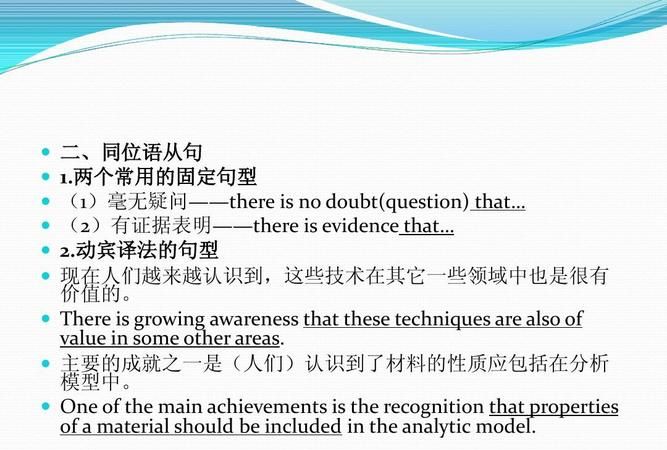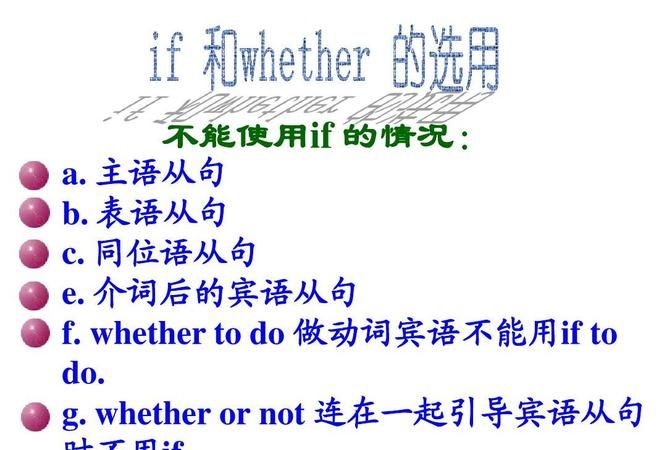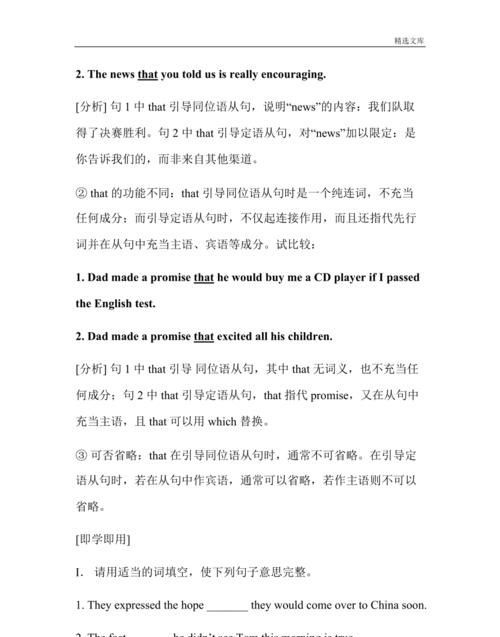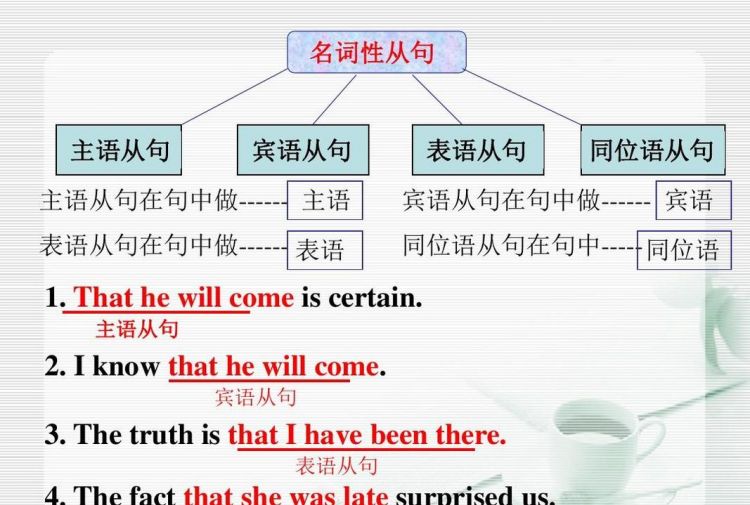本文目录
关于doubt的用法及解释
doubt是学习英语中的常用词,也是历年高考经常考查的词语之一,也是容易混淆的知识点之一。接下来我在这里给大家带来doubt的用法,我们一起来看看吧!
doubt的用法
1. 用作动词,在肯定句中,其后通常接 whether, if 引导的宾语从句,在否定句或疑问句中通常接 that 从句。如:
I doubt if [whether] that was what he wanted. 不知道那是不是他想要的。
I don’t doubt that you are honest. 我不怀疑你是诚实的。
Do you doubt that he will win the match? 你不相信他会赢得比赛吗?
在现代英语中,在肯定句中也可接 that 从句,如以下两例摘自朗文词典:
I doubt that [if, whether] he’s coming. (***) 我怀疑他是否会来。
I doubt that we’ll ever see George again. 我怀疑我们是否还会见到乔治。
2. 用作名词,与用作动词类似,在肯定句中后接whether从句(但不用if),在否定句中或疑问句后接that从句。如:
There’s some doubt whether John will come on time. 约翰能否按时来还很难说。
There is some doubt whether he will come to help us. 他是否会来帮助我们还有些疑虑。
I have no doubt that you will succeed. 我肯定你能成功。
3. no doubt可用作副词,表示“无疑地”“很可能”;通常用于首,有时也用于句中。如:
No doubt he was just trying to help. 他多半只是想帮帮忙。
The court will no doubt deal severely with the criminals. 法庭必定严厉地处置这些罪犯。
4. 习语without (a) doubt意为“毫无疑问”“一定地”,其中的冠词通常省略。如:
He is, without doubt, the greatest golfer in Japan. 他毫无疑问是称霸日本的高尔夫球手。
Without a doubt these theories are all wrong. 毫无疑问,这些理论都是错误的。
doubt的相关解释
n. 怀疑,疑虑;未确定;
vt. 怀疑,疑惑;
vi. 不确定,不能肯定或怀疑;
doubt的例句
1. There can be little doubt that he will offend again.
毋庸置疑他还会再犯的。
2. They have the usual quota of human weaknesses, no doubt.
毫无疑问,他们身上也有人所共有的弱点。
3. This new information does throw doubt on their choice.
这个新信息确实使人们对他们的选择产生了怀疑。
4. There was no doubt in his mind that the man was serious.
在他看来,这个人无疑是认真的。
5. I do not doubt that the bank acted properly.
我毫不怀疑银行的处理方式是妥当的。
6. Few in Westminster doubt that the government will win the day.
在英国议会中,几乎没有人对政府将会获胜存有怀疑。

doubt的用法及短语
doubt有怀疑,疑虑等意思,是 学习英语 中的常用词,也是历年高考经常考查的词语之一。那么你知道doubt有哪些用法吗?下面我现将doubt的用法归纳如下,欢迎大家学习!
doubt的用法:用作名词
1. doubt后面接同位语从句
(1)doubt用在肯定句中,后面接whether引导的同位语从句。注意不可以用if替换whether。例如:
He had his doubts whether they would give him another chance to have a try. 他不能肯定他们是否会再给他一次机会试一试。
There is some doubt whether their football team will win the match. 他们的 足球 队会不会赢得这场比赛还不能肯定。
(2) doubt用在否定句中,后面接that引导的同位语从句。 例如:
I have no doubt that he will succeed. 我相信他会成功的。
There is no doubt that they will agree with you on this matter.
毫无疑问,他们在这件事上会同意你的意见的。
2. doubt常与about/of/as to/on等介词连用。 例如:
There is no doubt about it. 此事无可怀疑。
I have no doubt of his ability. 对于他的能力我毫不怀疑。
She has her doubts as to this being true. 她怀疑这事是否真实。 No one has any doubt on this point. 这一点没有人会怀疑。
3. 由doubt组成的一些 短语
(1) no/without/beyond doubt无疑地;必定;当然。 例如:
It is no doubt difficult. 这无疑是困难的。
No doubt he didn”t mean to hurt you. 他肯定不是有意伤害你的。 Without doubt this is the best. 无可置疑,这是最好的。 Beyond doubt he will give you some advice on your study.
毫无疑问,他会给你的学习作一些指导的。
(2) in doubt怀疑;拿不定主意。 例如:
We are in doubt(about) what to do next. 我们不知道下一步要做什么。 When in doubt about the meaning of a word, consult the dictionary. 当你对一个词的意义没有把握时,就查一下词典。
(3) make no doubt of 对„„毫不怀疑。 例如:
We make no doubt of his sincerity. 我们对他的诚意毫不怀疑。
(4) throw/cast doubt on使人对„„产生怀疑。 例如:
Galileo”s experiments threw doubt on Aristotle”s theory of falling objects. 伽利略的实验使人们对亚里士多德的落体理论产生了怀疑。
What he had done cast doubt on his honesty. 他的所作所为使人们对他的诚实产生了怀疑。
doubt的用法:用作动词
1. doubt+名词或代词。
例如:I doubt his word. 我怀疑他的话。
They doubted him before. 他们以前曾经怀疑过他。
2. doubt+宾语从句
(1) 在否定句和疑问句中,doubt后面接that引导的宾语从句。 例如:
I don”t doubt that he can finish the task on time. 我相信他能按时完成任务。 Do you doubt that she will succeed? 你怀疑她会成功吗?
(2) 在肯定句中,doubt后面一般接whether或if引导的宾语从句。 例如:
I doubt whether they can swim across the river. 我怀疑他们能否游过河去。 He doubts if she will keep her word. 他不敢肯定她是否会遵守诺言。
注意:在肯定句中,doubt后面也可以接that引导的宾语从句,但表示疑虑较大或“不相信”。例如:
We doubt that they can complete the work ahead of time. 我们不相信他们能提前完成这项工作。 I doubt that he will come. 我看他未必会来。
doubt的用法例句:
1. There can be little doubt that he will offend again.
毋庸置疑他还会再犯的。
2. They have the usual quota of human weaknesses, no doubt.
毫无疑问,他们身上也有人所共有的弱点。
3. This new information does throw doubt on their choice.
这个新信息确实使人们对他们的选择产生了怀疑。
4. There was no doubt in his mind that the man was serious.
在他看来,这个人无疑是认真的。
5. I do not doubt that the bank acted properly.
我毫不怀疑银行的处理方式是妥当的。
6. Few in Westminster doubt that the government will win the day.
在英国议会中,几乎没有人对政府将会获胜存有怀疑。
7. It was without a shadow of a doubt the best we've played.
毫无疑问这是我们表现最出彩的一次。
8. At first I gave him the benefit of the doubt.
起初,我姑且相信了他。
9. I have no doubt that we are polluting the environment beyond redemption.
我丝毫都不怀疑我们对环境的污染是不可挽回的。
10. A referendum showed beyond doubt that voters wanted independence.
全民公决无疑显示选民支持独立。
11. There are factors, however, that have cast doubt on the statue's authenticity.
然而,有些因素让人对该雕塑的真伪产生了怀疑。
12. There was no doubt he was serious, it wasn't just playing around.
毫无疑问他很认真,那可不是闹着玩的。
13. They would no doubt welcome the action with open arms.
他们无疑将热烈欢迎这一举动。
14. White was in no doubt the referee made the correct decision.
怀特确信裁判作出了公正的判罚。
15. Local inhabitants haven'tthe slightest doubt as to who is the rightful owner.
当地居民对谁是合法所有者没有丝毫疑问。

doubt的用法
doubt用作动词表示怀疑,不信任,不确定;用作名词的基本意思是“怀疑,疑虑”,还可表示“未确定”。可用作可数名词,也可用作不可数名词。
一.doubt用作动词
1.doubt的基本意思是对事〔物〕的真实性等表示“怀疑”或“不信任”,有时甚至在调查研究之后仍“难以确定”。也常用来表示对宗教信条等持有疑虑。
2.doubt多用作及物动词,可接名词、代词、动名词、带疑问词的动词不定式或that/wh-/if从句作宾语,也可接以“(to be+) n./adj. ”充当补足语的复合宾语。接that从句作宾语时, that前有时可加but。
Maybe he changed his mind, but I doubt it.
也许他改变了主意,但我表示怀疑。
You can write to him if you doubt my words.
要是你不信我说的话,可写信去问他。
3.doubt偶尔也用作不及物动词,常与介词of连用表示“对…抱怀疑或悲观的态度”。
She said that I was getting into the habit of doubting.
她说我渐渐地好像对什么都不确定。
4.用作宾补动词
We doubted him a liar.
我们怀疑他是个骗子。
Nobody doubts him to have been honest.
没有人怀疑他曾经是诚实的。
5.在疑问句或否定句中, doubt的宾语从句应用that引导; 在肯定句中,则应由if〔whether〕引导。
二.doubt用作名词
1.doubt用作名词的基本意思是“怀疑,疑虑”,还可表示“未确定”。可用作可数名词,也可用作不可数名词。
2.doubt后可接介词about〔of, on〕引起的短语表示“对…怀疑”。
3.doubt后可接that或if〔whether〕引导的同位语从句。that从句一般用于否定句或疑问句中; if〔whether〕从句一般用于肯定句中。
Is there any doubt that he is a thief?
他是个贼难道还有疑问吗?
There is some doubt whether she will come on time.
她会不会准时来还不一定。

doubt的用法及短语
doubt的准确意思是“对.表示疑惑”,在肯定句中常与if或whether搭配使用,意思是“我对xxxx是否发生表示疑惑”,“我对xxxx是对的还是错的表示疑惑”等等.
而用doubt that时,后面要接的是 将要发生或已经发生的一个事实,表示我对这件事的怀疑.而且doubt that通常用在否定句里,表示“恐怕、不会”的意思.用于肯定句的话,还是doubt if/whether更符合习惯.
I doubt if she will change her mind.意思是我怀疑她是不是真的会改变想法.
I doubt that she will change her mind.意思是我恐怕她不会改变想法.
又例如:
I doubt if/whether he will win.我怀疑他能否赢.
I don't doubt that he will win.我不怀疑他会赢.
doubt和suspect的意思上差不多.
doubt更口语化.
suspect更书面化、正规化,而且一般就直接写suspect sth,没有suspect if/whether这样的搭配.suspect that 倒是比较常用,比如:
I suspect that she told a lie. 我怀疑她说谎.
作为对比,I doubt that she told a lie意思是我觉得她没说谎,不过貌似一般比较少这么说.
1 doubt的用法
解答: 1,doubt当动词时,在<肯定句>中后面可接if或whether。
在否定句及疑问句中可跟that从句。有时在<肯定句>中也能跟that从句,但其含义是"恐怕...不会"。
I doubt if (或 whether) he will win.
我怀疑他能否赢。
I don''t doubt that he will win.
我毫不怀疑他会成功。
Do you doubt that he will win?
你怀疑他会成功吗?
I doubt that he will win.
恐怕他赢不了。
2,doubt of
对...抱怀疑或悲观态度。
The project began badly and we doubt of its further progress.
这项工程开始就不顺利,我们怀疑能否继续进行。
3,no doubt后接that从句或介词of。
We have no doubt that you will succeed.
We have no doubt of your success.
我们毫不怀疑你会成功。
There is (It is 误) no doubt that you will succeed.
毫无疑问你会成功。

以上就是关于同位语从句doubt用法 ,Doubt的用法是什么的全部内容,以及同位语从句doubt用法 的相关内容,希望能够帮到您。
